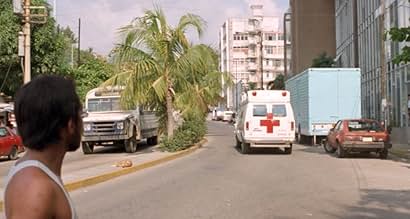NOTE IMDb
5,1/10
1,2 k
MA NOTE
Ajouter une intrigue dans votre langueAn adulterous woman's faith in God is tested when her husband dies and miraculously comes back to life.An adulterous woman's faith in God is tested when her husband dies and miraculously comes back to life.An adulterous woman's faith in God is tested when her husband dies and miraculously comes back to life.
Daniel Ades
- Dr. Mendes
- (as Daniel Addes)
Histoire
Le saviez-vous
- AnecdotesOne of seven films that actress Theresa Russell has made with director Nicolas Roeg. The films include Eureka (1983), Track 29 (1988), Cold Heaven (1991), Hôtel Paradis (1995), Enquête sur une passion (1980), Une nuit de réflexion (1985) and the "Un ballo in maschera" segment of Aria (1987).
- Versions alternativesFor the Indian television premiere, the film was cut by 12 minutes to achieve a 'U' certificate by the CBFC in Chennai.
- Bandes originalesMariachi Walls
Music by Jimmie Haskell (as Jimmie Haskel)
Courtesy of Southern Library of Recorded Music
Commentaire à la une
Its cinematic treatment of the dead coming to life is the most interesting take I've seen on the genre. He is like coming apart at the seams. Its job is to cast a spell around the rest of the movie. This is the stuff of high theater. It is both literal and symbolic at once, a very Japanese treatment. Every time I remembered it from my first viewing it was just that guy's portrayal of the undead.
Somebody said it's like a soap opera performance, but this is exactly it. He is performing a soap opera character except vomiting blood, hurling, and having Frankenstein meltdowns. Instead of using soap as a pejorative, we can say it is a high art treatment of a soap. But the average viewer might not realize it, somehow this might play straight to them.
There is something about the contrast of the cable TV movie, with a Nic Roeg film, that is both jarring and weird, but never operating outside the viewer and the screen.
The climax of the movie is a cross being burned into the hill by God, then she runs in his arms, the saxophone plays. The film is about her thoughts of infidelity haunting her, and her returning to live in service to God.
I was not sure if she would run into the lovers arm because that would be a valid reading of the film as well. To forget her husband, he was dead all along, to move on. It would be a tale of sexual healing and grief. But Roeg had made that film several times by that point. Instead, to elevate such a small human dilemma to the grandest stage is the power of melodrama, the power of art.
Some of the early Peter Weir films dealt with white guilt and aboriginal spirituality with some of these tones. Another review said with auteurs we don't watch their filmography expecting them to top themselves, we go for the small pleasure of how they have twisted the dial slightly differently. All that is interesting in his films are here, although it does a disservice to put them into words. So a Christian work is unexpected, but using his avant-garde eye becomes a spontaneous combustion; it is impossible to go wrong dealing with the very symbols of reality, life, death, love, morality.
The lightning bolt awakening becomes something in films; that enlightenment isn't just about that, but about the inverse, a complete intolerance toward immorality. This is why her awakening is triumphant. It brought him back, finally, for real. Roeg was the rarest thing, a western auteur, uncompromising and without commercial interests. But this, his most obscure work is somehow his most directly meaningful, but at the same time you sense that having such direct answers is kind of a problem for him.
Somebody said it's like a soap opera performance, but this is exactly it. He is performing a soap opera character except vomiting blood, hurling, and having Frankenstein meltdowns. Instead of using soap as a pejorative, we can say it is a high art treatment of a soap. But the average viewer might not realize it, somehow this might play straight to them.
There is something about the contrast of the cable TV movie, with a Nic Roeg film, that is both jarring and weird, but never operating outside the viewer and the screen.
The climax of the movie is a cross being burned into the hill by God, then she runs in his arms, the saxophone plays. The film is about her thoughts of infidelity haunting her, and her returning to live in service to God.
I was not sure if she would run into the lovers arm because that would be a valid reading of the film as well. To forget her husband, he was dead all along, to move on. It would be a tale of sexual healing and grief. But Roeg had made that film several times by that point. Instead, to elevate such a small human dilemma to the grandest stage is the power of melodrama, the power of art.
Some of the early Peter Weir films dealt with white guilt and aboriginal spirituality with some of these tones. Another review said with auteurs we don't watch their filmography expecting them to top themselves, we go for the small pleasure of how they have twisted the dial slightly differently. All that is interesting in his films are here, although it does a disservice to put them into words. So a Christian work is unexpected, but using his avant-garde eye becomes a spontaneous combustion; it is impossible to go wrong dealing with the very symbols of reality, life, death, love, morality.
The lightning bolt awakening becomes something in films; that enlightenment isn't just about that, but about the inverse, a complete intolerance toward immorality. This is why her awakening is triumphant. It brought him back, finally, for real. Roeg was the rarest thing, a western auteur, uncompromising and without commercial interests. But this, his most obscure work is somehow his most directly meaningful, but at the same time you sense that having such direct answers is kind of a problem for him.
- ReadingFilm
- 22 mars 2024
- Permalien
Meilleurs choix
Connectez-vous pour évaluer et suivre la liste de favoris afin de recevoir des recommandations personnalisées
- How long is Cold Heaven?Alimenté par Alexa
Détails
- Date de sortie
- Pays d’origine
- Langue
- Aussi connu sous le nom de
- Холодний рай
- Lieux de tournage
- Sociétés de production
- Voir plus de crédits d'entreprise sur IMDbPro
Box-office
- Budget
- 4 500 000 $US (estimé)
- Montant brut aux États-Unis et au Canada
- 99 219 $US
- Montant brut mondial
- 99 219 $US
- Durée1 heure 45 minutes
- Couleur
- Mixage
- Rapport de forme
- 1.85 : 1
Contribuer à cette page
Suggérer une modification ou ajouter du contenu manquant

Lacune principale
By what name was Cold Heaven (1991) officially released in Canada in English?
Répondre






























